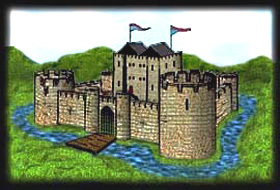
Many years pass by in grim procession,
my dignity my only possession.
This castle of solitude rises behind:
my drawbridge is privately a frame of mind.
The moat is deep and the walls are high,
looming tall under a stormy sky.
These battlements are pitted and scarred;
if men come close, they will get ‘tarred’.
I chase them off in self defence
before they give me any offence.
For I have been wounded in the battle of love,
bruised and battered when push came to shove.
Another time, I was quite unprepared
to learn that our love had been shamefully shared.
My tarnished knight, though he swore love eternal,
proved himself false, a scoundrel infernal.
So you see, inside I do cower,
within walls so solid, in my ivory tower.
I’m happy with my books and my cat –
it’s a sheltered life, nothing wrong with that.
No one needs me and I don’t need the fuss.
Just me and my cat, forever thus.
If a brave, shining knight set his heart on me
he would have to cast a spell to set me free.
|
| Writing Prompt |
Write a poem of any type and any length that tells a story. |
Author Notes
Author's Note
(a story about spelling variations in case you think I can't spell):
'Defence' and 'defense'
These are different spellings of the same word. 'Defense' is preferred in American English, and defence is preferred in all other main varieties of English, including Australian, British, and Canadian English. Though 'defense' is now the American spelling, it is not American in origin. The OED and Google Books reveal examples of the spelling from as long ago as the 1300s, many centuries before the United States existed. That spelling continued to appear a fraction of the time through the 19th century, when it was taken up by American writers. Today, to the chagrin of those who dislike American English, the spelling is gaining ground throughout the English-speaking world.
Other than how they are spelled and where they are used, there is no difference between 'offence' and 'offense'. 'Offense' is the preferred spelling in the United States, and 'offence' prevails in all the main varieties of English from outside the U.S.
'Offence' and 'offense'
The American spelling gained steam through the 19th century, after being promoted in Noah Webster's 1831 dictionary and all later editions, but didn't become the more common form in the U.S. until the early 20th century. The spelling was not invented in the U.S., however. Webster and his contemporaries, in forging what they viewed as a more logical and more American variety of the language, actually just revived an old spelling that had been appearing to varying degrees since the 14th century, long before the United States existed. The Oxford English Dictionary cites examples of 'offense' from as long ago as 1395 and their earliest instances of 'offence' are from just a decade earlier, though it is true that the modern British spelling was settled by the 17th century and that 'offense' was no more than a rare variant by the time the Americans adopted it.
Regardless of spelling, the word is usually pronounced OFF-fence in sports-related contexts, and off-FENCE in all other contexts. There's no good reason for this difference. Blame sports commentators.
|
|



